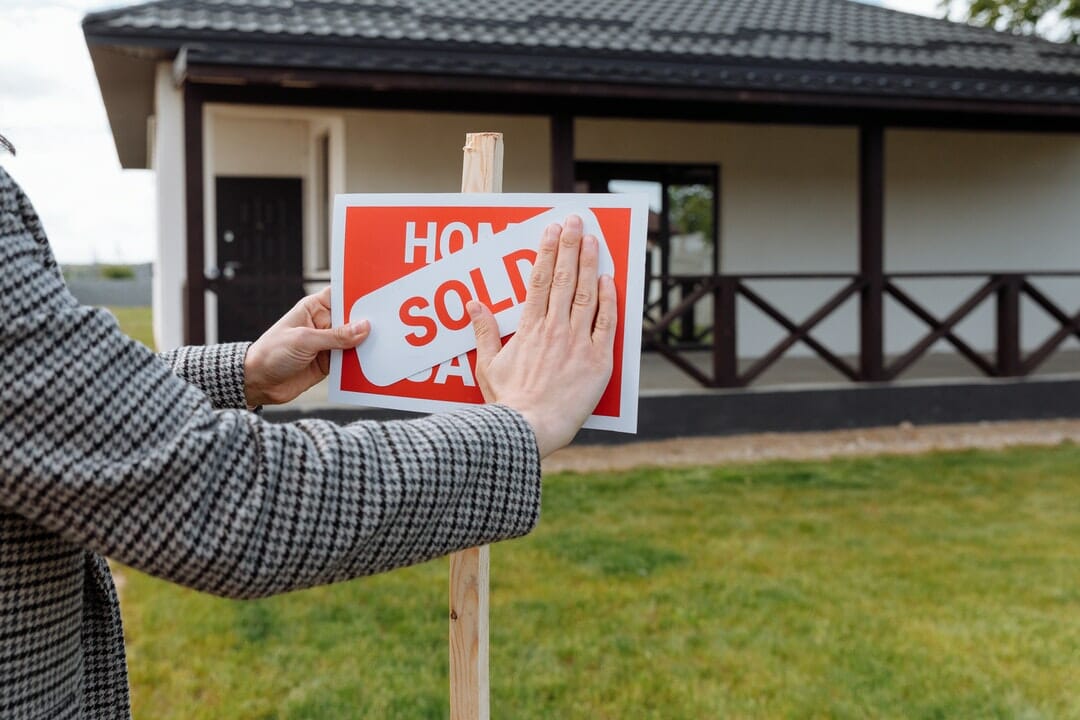Auctions are becoming a more popular way to buy real estate in the UK but not many people are familiar with the format or process. If you want to know how to buy a property at auction but don’t know where to start, this Beginners Guide will set you on the right track.
Our simple guide will help you find the answer to the question “Is it worth buying property at auction?” The short answer is ‘yes’. Auctions are a good place to find interesting properties for below market price. And if you know how to bid and navigate the legal process afterwards, you can very well find your dream home at one.
Now, let’s look at how to buy a property at auction in more detail.
- Why types of properties are sold at auction?
- How does a property auction work?
- Where can I find auction properties?
- How to prepare for an auction
- How to buy a property at auction?
- Are there any risks of buying a property at auction?
- What are the benefits of buying a property at auction?
- Conclusion
Why types of properties are sold at auction?
There are various types of properties that you can expect to find at an auction. These can be both residential and commercial but they have a few things in common. Usually, properties at auctions are unkempt, repossessed or in need of repairs. Most of these properties will be sold at below the market prices but that doesn’t mean that the bidding process won’t see the asking price rise substantially. Especially if the property is in a desirable area or has investment potential.
There are many types of properties sold at auction. These may include:
- Properties that are considered ‘unmortgageable’ by mortgage providers due to their condition, construction materials used, or similar issues.
- Properties with sitting tenants.
- Conversion opportunities and fixer-uppers.
- Properties that may be split into several, smaller units.
- Mixed-use properties (e.g. apartments located above retail units, which are also included in the sale).
- Land.
- Commercial property.
How does a property auction work?
Auctions follow a standard format depending on whether it is held in person or online. Every listed property has a guide price. The seller usually provides a reserve price that is kept confidential. It simply shows the minimum they are willing to accept.
The traditional method: you have to be present in person at these auctions to place your bid. The auction house that handles the sale will notify all participants of the order and rules for participation. Usually, the winning bidder has to put down a 10% deposit on the day of the auction. The rest is payable within 28 days. Contracts are exchanged on the day of the auction, too.
The modern method: these auctions are held online and the winning bidder puts down a reservation fee to secure the property (around 5%) on the day of the auction. The buyer then has 28 days to exchange contracts. There is an additional period of 28 days to complete. The reservation fee is payable in addition to the amount bid on the property and is held by the auctioneer until contracts are exchanged. You can bid in the following ways – live online bidding and online proxy. With online bidding, you can watch the auction countdown online, and you place your bids in real time. If you are unable to bid live, you can pre-submit your highest offer by online proxy. The proxy bidding is regulated automatically. If your bid has met the reserve price you will be notified.

Where can I find auction properties?
Each area is serviced by an auction house. These list upcoming lots on their website in advance and also email a catalogue that’s distributed on the day of the auction itself.
For online auctions there is a ‘Guide Price’ – which is an indication of the minimum the property could reasonably be expected to sell for. You will additionally receive photos, a floorplan, a written description, and a copy of the property as part of the Legal Pack.
The Legal Pack is an important collection of documents that the vendor’s conveyance is responsible for putting together. You should read it before bidding.
How to prepare for an auction
If you are considering buying a property at auction you need to start the process with realistic expectations. There is no guarantee your bid will be the winning one but there are some steps you can take to prepare yourself.
Start by deciding on the area you’re interested in and contact the auction houses that cater to that area. You can then request their catalogue and subscribe to their mailing list. UK Auction List or Essential Information Group both provide a list of upcoming property auctions.

1. Research
Study the catalogue and make a list of properties you like. You can get in touch with the auctioneers and arrange an appointment to view the properties. Keep in mind that properties sold at auctions are often in a poor state, which is why you can get them for a price that is way below market.
You need to know what is an appropriate amount to bid so you don’t over-extend your offer. Bring along a builder or an architect with you to any viewings so they can inspect the property and let you know how much it will cost to fix it up.
The guide price is just that – a guide price. It is not the final price that the property will be sold for. Ask local estate agents and compare it with other properties being sold locally so you have a realistic price in mind for the auction.
2. Consider a survey
It is not uncommon for properties sold at auctions to be condemned by the local council soon after the sale. If this should happen, then you are also liable for the demolition charges. So make sure you know what you’re buying. Invest in a homebuyer’s report and a structural survey, if you can afford one. The homebuyer’s report will only set you back about £600 but you could end up losing much more if you decide to skip on it.
3. Scrutinise the legal pack
Auctioneers usually give you a legal pack for properties you’re interested in. The documents included are: title deeds, local authority and environmental searches, fixtures-and-fittings list and a seller’s information form plus any relevant leasehold information. You can have a solicitor look over this for any hidden covenants or loopholes that could end up costing you more in the long run.
4. Don’t expect to pay the guide price
The guide price is usually set a lot lower than what the property is likely to go for. You can monitor it in the days ahead of the auction. If it goes up this shows there is a lot of interest in the property.
5. Get your finances in order
If you don’t have savings or cash in hand, you may consider applying for a bridging loan. This is a type of loan that is easier and faster to apply and get approved for than a traditional mortgage.
Keep in mind that with auctions you need to act fast. If your bid is accepted, as the hammer falls you’ll have to pay 10% and then you’ll only have a month to pay the remaining 90% – if you can’t you will lose the 10% you put down as well as the chance of buying the property.
You may also have to factor in the costs of re-selling the property, including any shortfall between the price you agreed to and the final selling price. In some instances, you may be charged interest every day until the property is sold.

How to buy a property at auction?
After you have done your research and are no longer wondering “Is it worth buying property at auction?”, you can move on to taking action to buy your first property at auction. You can do several things to prepare for the day of the auction. Get your deposit ready as you will have to pay that as the sale is finalized with a credit or debit card, or, occasionally, by cheque.
You then have 28 days (or less) to pay the remaining amount. If you’ve got the money in the bank, you can do a bank transfer. But if you need to borrow the money, you’ll need to apply for a bridging loan.
Short-term bridging loans are ideal if you’re hoping to renovate the property and sell it on quickly or just need the money fast. Because you need to act fast, bridging loans are a more suitable alternative to mortgages, especially if you are close to your 28-day deadline. You can apply for a bridging loan to secure the property, and then switch to long-term funding afterwards.
Keep in mind that if you fail to pay within 28 days, you’ll lose your deposit and your right to purchase the property. You may also be liable for the costs associated with selling the property again.
Bridging loans are convenient because they last up to 12 months, giving you plenty of time to transition to a mortgage at any time after the purchase.
Are there any risks of buying a property at auction?
High-cost purchases always come with a certain level of risk regardless of the method of buying the property. It is possible that the property is misrepresented or it turns out to not be what you expected.
The biggest risk with an auction is if you rethink the purchase after placing the winning bid. If this happens, you will lose any monies already paid and be liable for hefty administration fees.
Make sure you study the small print in the legal pack, with the help of a solicitor. This will minimize all risks and put you in a good position to know exactly what you are purchasing. Making an informed decision and reducing risk go hand in hand before going to the auction.

What are the benefits of buying a property at auction?
Auctions are a good place to find interesting properties that are worth investing in. Most properties sold at auctions are fixer-uppers but after you put in the work, you’d be left with a good investment.
If you carry out the proper due diligence on the house you’re bidding on, you have nothing to worry about. This means you need to visit the property, research the area and potentially organize an independent survey and house valuation.
Be sure you are aware of the prices the properties tend to sell for so you can have a realistic maximum bid. You also need to be able to prove that you have the funds readily available straight away and also sort out buildings for the day of auction.
Conclusion
Buying a home at a foreclosure auction is a good alternative if you are on a budget or you don’t mind doing some repairs especially if you can land a great deal. Just don’t fool yourself into believing purchasing at auction doesn’t take prior preparation.
Hopefully, the information provided in this how to buy property at auction guide will be educational enough, so you are better prepared for the process.


